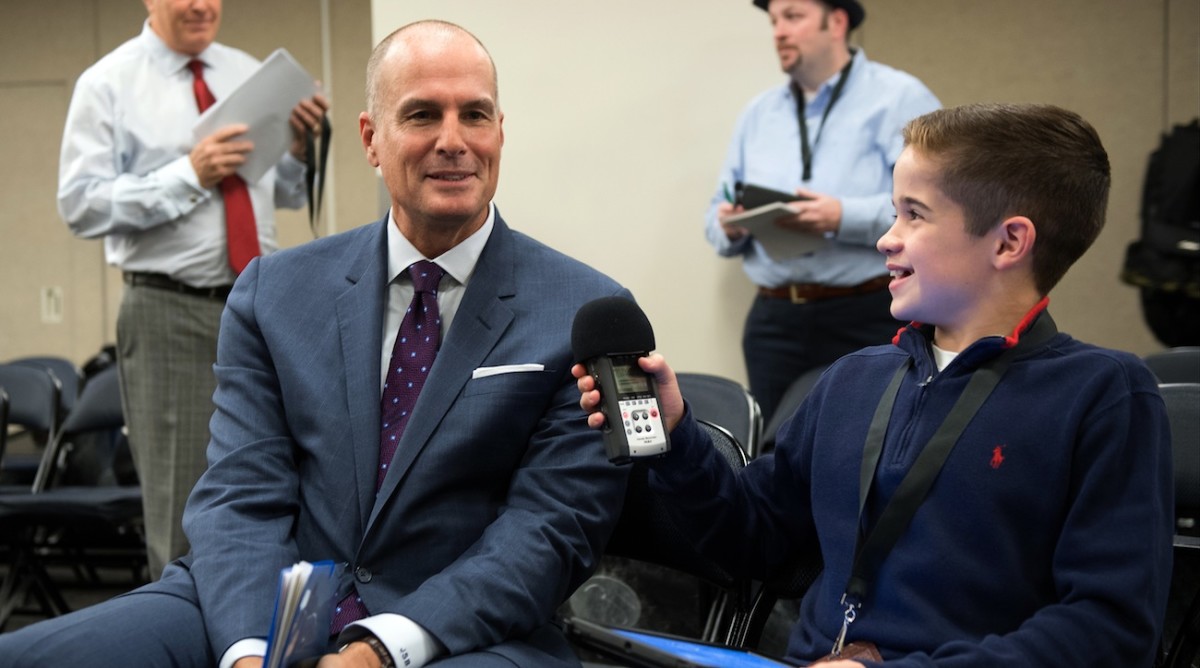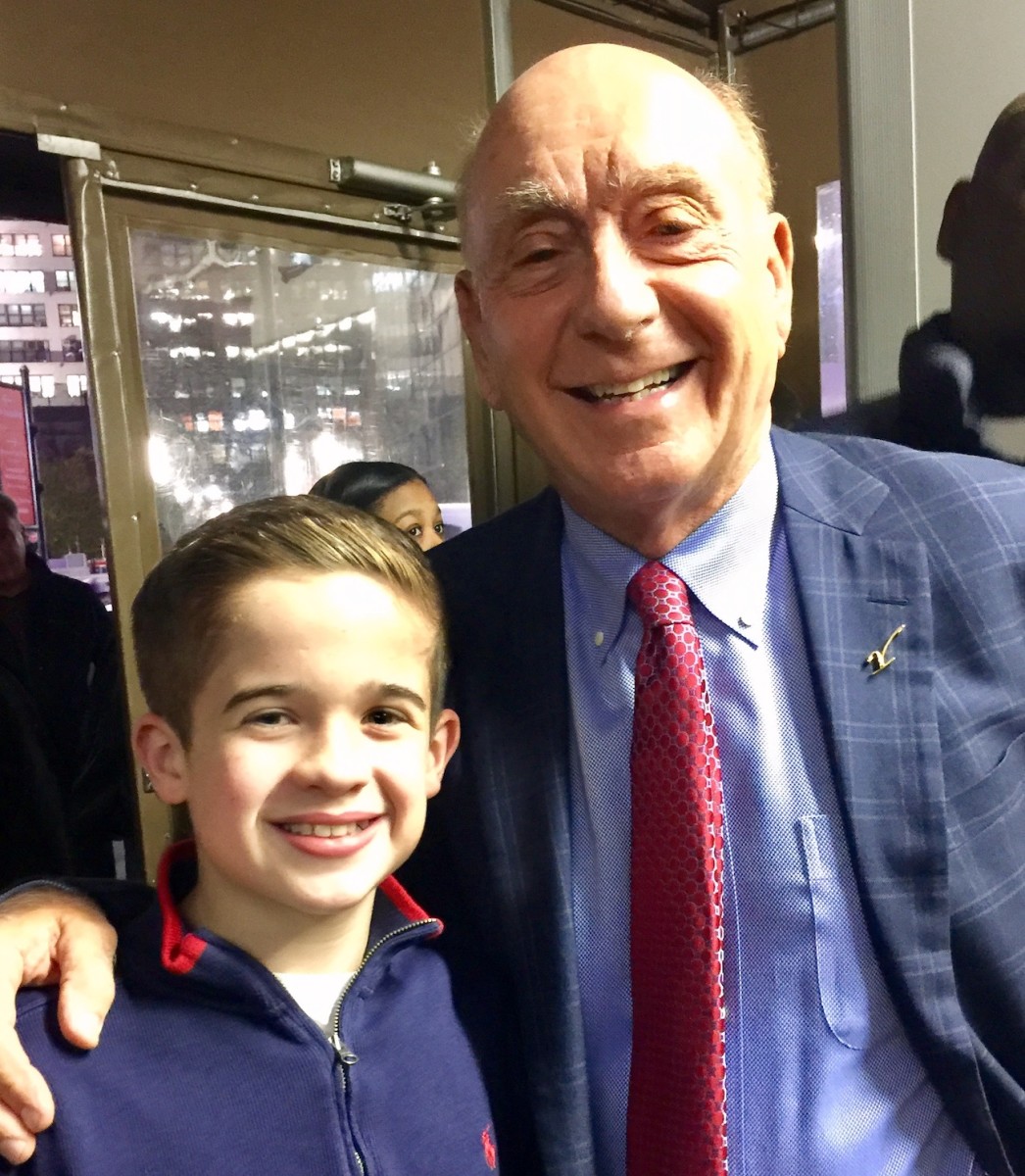Catching up with Jay Bilas and Dick Vitale


When I was at the Champions Classic at Madison Square Garden earlier this season, I spoke with two award-winning sportscasters, Jay Bilas and Dick Vitale. I asked them about their experiences on and off the court, how the game has changed, and what sets them apart as on-air commentators. Going by Dickie V’s dictionary, they would both make the All-Rolls Royce Team for being superstars at their positions.
Bilas played for the Duke Blue Devils from 1983–86 under coach Mike Krzyzewski. Bilas was drafted by the Dallas Mavericks and played professionally for two years in Europe before returning to Duke as an assistant coach during a stint that included the Blue Devils’ 1991 and ’92 national championships. He had a successful law career before becoming an analyst on ESPN and one of the most respected voices in college basketball.
What advice do you have for kids who love sports but might not be able to play in college or the pros?
My best advice would be to find what you like to do and pursue it. When you're younger, and you don't have a lot of obligations, chase after what you want to do. You'll know when it's right to try something else if it's not working out, but I've been lucky to be able to do what I want to do. It doesn't seem like I've ever worked, so I'm really fortunate, and I know it. I'm very grateful to be in the position I'm in and to be doing something I like doing.
You're also pretty gifted with your genes. I mean, I wish I was 6'8"!
I wish I was 6'9"! If I was taller, I would have been a better player, but yeah, being 6'8" was very helpful in basketball. It wasn't very helpful in finding pants, but in basketball it was very helpful.
What did you like best about playing in Madison Square Garden when you were a player?
I didn't get to play here. My team played here. I was hurt my senior year, so I was injured the first few games. I had to sit out when we played in the Big Apple NIT. I was wearing a suit instead of playing, so it was really frustrating for me personally. Our team won the tournament, so that was kind of fun.
For anybody who gets to be here, let alone play here, it’s a thrill. This is a bucket-list place, and it's right up there with Fenway Park or Wrigley Field or Allen Fieldhouse or Cameron Indoor Stadium. It’s one of the great venues in all of sports.
Is it true that back in college when you played for Duke you had the biggest biceps?
I thought I did. Yeah, even though 6'8" sounds like it was big, I played center, and I think I was the smallest center in the ACC — or one of them — for four years, so I felt like I needed to get a little stronger to hang with some of the great players I had to guard. Most of them were 6'11" or 7 feet, so I spent more time in the weight room than some of my teammates did.
Would your 1986 team with Johnny Dawkins have beaten this year's Duke team?
We would have been really competitive at every position except the center spot. Johnny Dawkins was one of the greatest players I've even seen, and Tommy Amake is now the head coach at Harvard. Mark Alarie and David Henderson — we had a great team. I was really the only anchor dragging us down, but it was a good group of guys. We would be competitive with these guys, but the current players keep getting better and better. They're just younger. They only thing we would have had on these guys is we're older.
I understand that coaches know and admire that you come prepared to games as a broadcaster. What do you do to prepare?
I talk to people. I talk to coaches a lot, and I watch a ton of film. That's really helpful. I get to know the players when they are in high school, so even if they do leave early, I've got a base of knowledge before they even get here. And I love it, so when you love it you pay attention to it; you watch every detail. I'm hoping not to make every game a clinic, but I enjoy it so much.
Did you always know that you wanted to be an on-air commentator?
I thought I did, when I was a kid. I thought that someday I was capable of doing this, I just didn't know what it took. I started working when I was in college. I was a runner, a gopher, and I worked for ABC Sports during the summer and got to know a lot of people and thought, This is something I would really like to do. I wasn't sure I could ever do it at a decent level and make a living at it, so that's been a pleasant surprise.
How did you become so good at this?
Well, that's nice of you to say. I don't look at it that way, but I just work at it, and when you start it, you try to learn as much as you can. And I paid attention because I work with great people, not only the play-by-play people I work with and all the sideline reporters, but our producers and directors are awesome, and they are superstars. They don't get seen on camera, but they're superstars, and you try to listen to them as much as you can.

Dick Vitale, who over the years has become an ambassador of sorts for the college game, joined ESPN during the 1979–80 season, just after the network’s September 1979 launch, following a successful college and professional basketball coaching career. In 2008, he was inducted into the Naismith Memorial Basketball Hall of Fame.
How did you come up with all your catchphrases such as “Awesome Baby?”
Really just from having a lot of fun from the days I was coaching. I took what I would say in the locker room. Players would say, Coach, I need the rock, baby. How can I score without the rock?
So I would take it from the locker room to television. Plus, people write letters to me, and I steal them.
How has the game of basketball changed since you first started in this industry?
The players are more physical, quicker, more athletic, more explosive. I think the talent level has totally changed. Now the skills of the game aren't probably as good as they were earlier, passing and shooting, but the physical skill and bodies of the players are certainly changed.
How do you feel about the one-and-done situation in college basketball?
Well, you know, one-and-done is there, and we have to live with it. Do I like it? No, I really don't. I would rather have a situation where kids have to stay in school for three years, but again it's out of our hands and their coaches, they do what they have to do to get the best players. Obviously when you look at Kentucky and you look at Duke, they've been able to do that.
These interviews have been edited for length and clarity.
Photographs by (from top): Lance King/Getty Images; Max Bonnstetter
